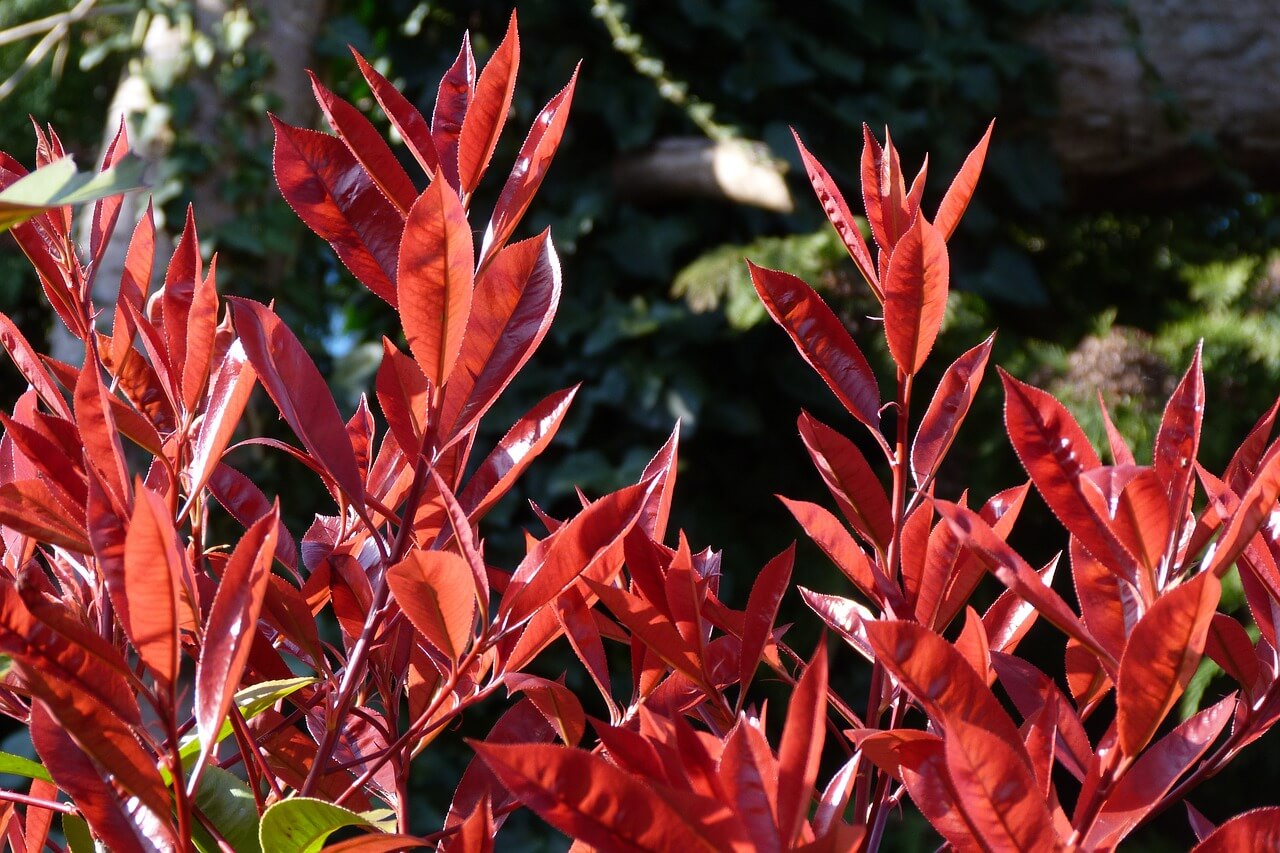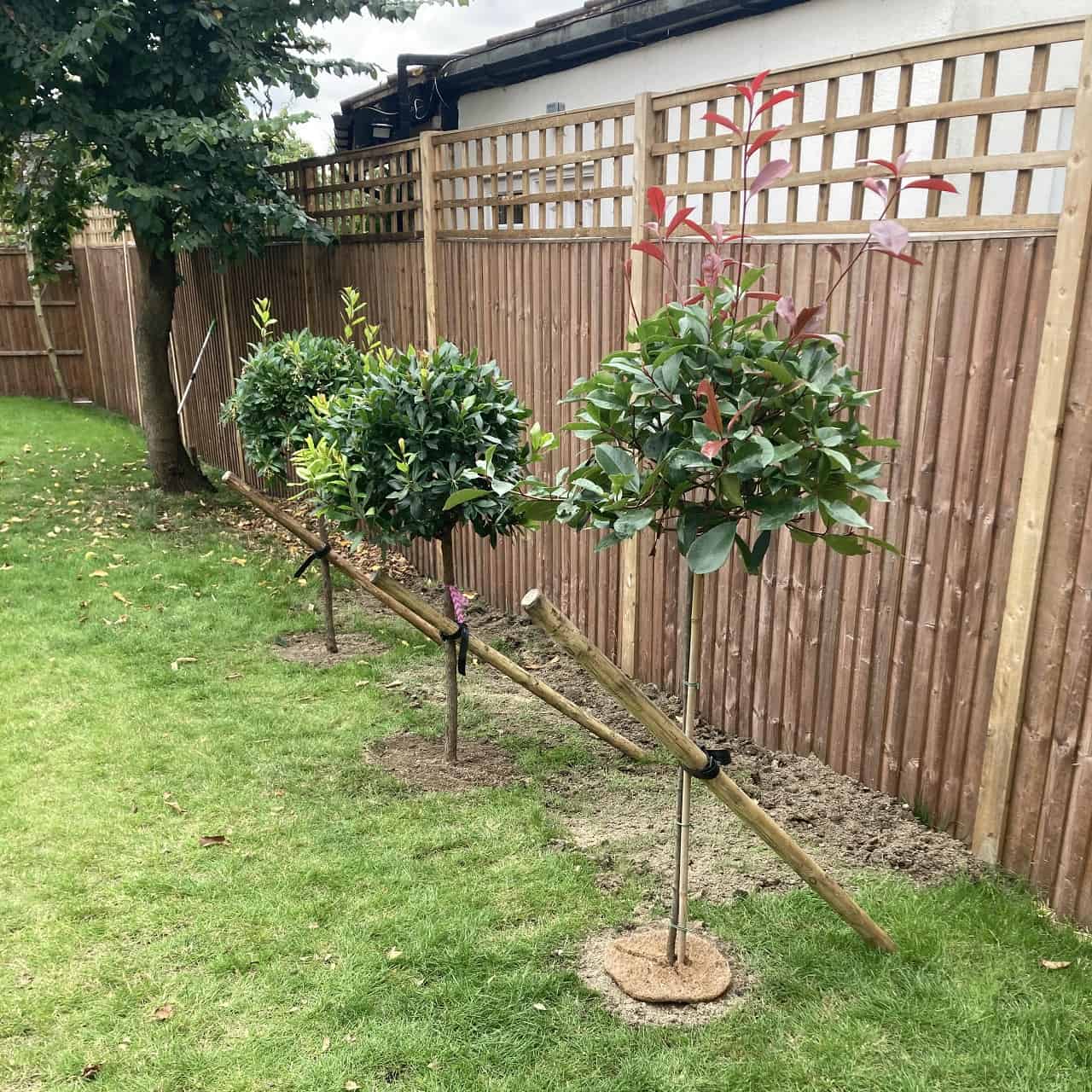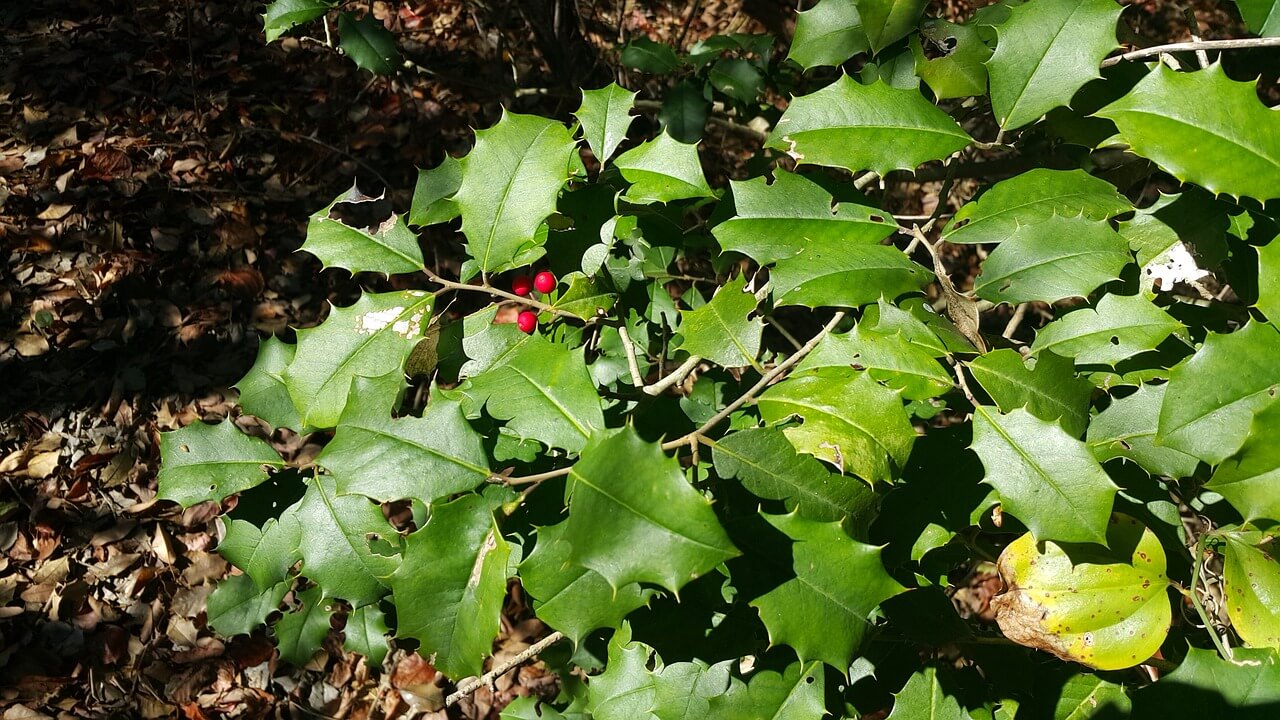If you’re looking for a little natural privacy and screening for your house, why not try plants? There are a great many that will grow up to be attractive plants, that can keep your house sheltered and hidden away! Here are some of my favourites:
Best Trees For Privacy And Screening

Photinia Red Robin
This gorgeous plant is ideal for hedging and screening, because it grows at a rate of knots! Red Robin can put on up to 30cm a year, and the new growth is a gorgeous shade of red (hence the name).
It likes to be in a full sun position, with loose, well draining soil and a good air circulation. You won’t need to water it often once it is established as it is drought tolerant and can handle drying out – you’ll only need to get the watering can out during prolonged hot dry periods.
Give it a prune once a year (you can cut it back quite harshly and it will still pop back up), and feed with fish, blood and bone meal in the spring and the autumn.
Strawberry Tree
The beautiful strawberry tree, with its evergreen leaves and interesting fruits, makes a great hedging plant – not least because it is evergreen. You will notice that it attracts a lot of wildlife, from pollinators to birds and small mammals, who like to eat the fruits.
It likes to be in full shade to partial sun, and prefers neutral to slightly acidic, well-draining soil. It is pretty hardy, but if you live in colder areas it will need some protection against frosts and cold winds, especially when it is young. Water it well in dry periods, and avoid feeding it – the strawberry tree does best in poor soil.
Have a look at this photo of two strawberry trees and one Photinia Red Robin, all newly planted in my garden (I bought them from Jacksons Nurseries).

Cherry Laurel
The fast growing cherry laurel can put on as much as 60cm a year, making it a perfect choice for filling in those bare areas or using as a screen. They remain evergreen for most of the year, though they may look a little sorry for themselves until the spring growth starts.
This plant is happy in full sun to partial shade, though you will notice more fruits and flowers if it is in more sunlight. It can tolerate a wide variety of soil types, from sand to clay – as long as the soil is well draining, as it really doesn’t like to be waterlogged. Add some mulch to the roots once a year to give it some extra nutrients. Give it a prune when it starts to get too big for its boots – cherry laurel can grow up to 5m tall and wide, so it can end up shading your garden.
Leyland Cypress
This plant is great for when you want a hedge quickly – it can grow up to 4 feet in a year! Plant several together in a line to create your hedge shape, and prune them regularly to get them growing how you want.
Leyland cypress is extremely hardy, and can handle just about any soil type unless it is overly dry or overly wet. These plants can grow in full sun to partial shade – though you will get better foliage in the sunnier areas. They won’t need feeding, or excessive watering – the only thing to consider is that they are VERY good at growing, so you may have to watch out if your neighbours start complaining.
Thuja
Thuja Plicata is another fast-growing conifer that makes an excellent screening plant. It grows fast and needs very little maintenance, making it ideal for places that you need to fill with plants quickly.
Thuja likes to grow in the sun, and it will need well draining soil that is kept slightly moist. The type of soil is not too much of an issue; this plant will happily grow in heavy clay or light sand. It is very hardy, so you won’t have to worry about it getting too cold in the winter – just remember to water it in the summer if you have long periods of hot weather.
American Holly

Holly makes a great hedging plant – especially if you want some texture in your garden, or you want to discourage neighbours from climbing through your hedge! Its glossy green leaves are a great contrast to the bright red berries.
Holly prefers to get a good 6-8 hours of sun a day, but it will also grow in partial shade. It likes its soil to be acidic – if yours is alkaline, you can dig in some peat moss to change the pH. Prune it in the winter (be sure to wear gloves!) to ensure that it is growing in the shape you want – left to its own devices it will be shaped like a pyramid. Holly is pretty self-contained, but it enjoys a little organic mulch around its roots in the winter, for added nutrients.
Yew
The majestic yew is a wonderful hedging plant – not as fast growing as some of our other suggestions, but it makes a great screening plant with time.
Yew is a very easy plant, that you can pretty much leave to its own devices apart from watering it when it gets too hot and dry. You can grow it in either full sun or full shade, in moist soil that drains well. You won’t have to water much once it is established – yews prefer their soil to be on the dry side. Do bear in mind that all parts of Taxus are deadly poisonous to people, so make sure you keep children and pets well away, and wash your hands thoroughly after you have pruned it.
Privet
Privet is a well-known hedging plant; it is easy to grow and care for, and it can grow as much as 60cm a year.
Your privet hedge will need to be planted in full sun where it gets at least 6 hours a day, although it will also tolerate a bit of shade. Privet like well-draining soil that is filled with nutrients – you can add fertiliser, green compost or manure to add a little more to the soil if yours is poor. This plant is easy to trim and to shape, and it will bounce back after even a hard pruning.
Final Words
Finding the best trees for privacy and screening can be tricky, but hopefully you now have a better idea of what to look for, so you can create your own beautiful, natural fence!







